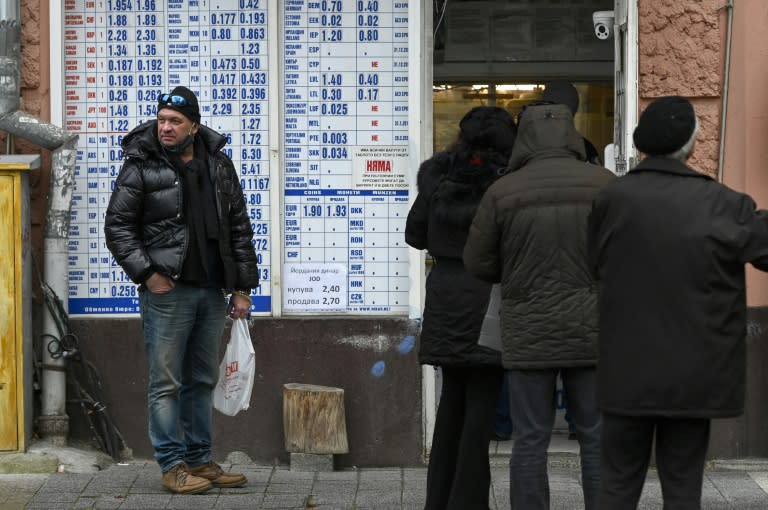Bulgarians divided over membership in euro waiting room
[ad_1]
Bulgaria could join the eurozone in 2024, but the poorest country in the EU is divided over the prospect of abandoning its national currency and joining the European single currency club.
Krasimir Atanasov, a 37-year-old tennis instructor who queues at a bureau de change in the Bulgarian capital Sofia, is keen on change.
Like millions of his compatriots, he emigrated abroad – in his case to Finland – and wants Bulgaria “to be like other European countries” and to use the euro.
However, Valeria Petrova, 58, who describes herself as a “nationalist”, says she wants to “keep the lev”, the national currency of Bulgaria.
She fears that the country will one day find itself in the shoes of Greece, which has had to implement painful structural reforms in return for help during a debt crisis that threatened its membership of the euro area.
Another man next to her in the queue says he fears the euro could lead to higher prices – a concern many Europeans had when 12 countries started using the currency on January 1 2002.
Even one of the country’s tour operator associations, ABTTA, says that while the single currency would make doing business easier for the industry, it is worried about a possible “reduction in purchasing power” for Bulgarians.
– Straitjacket –
Bulgaria joined the EU in 2007.
Last year, the country joined the European Banking Union and an exchange rate mechanism in which a candidate country must spend a minimum of two years before being admitted to the euro area.
The expected exchange rate for membership is 1.95583 lev per euro – the same value the currency has had since the creation of the euro zone in 1999.
The new government was sworn in earlier this month after a year of political stalemate vowing to take “all necessary measures to join the eurozone”.
Finance Minister Assen Vassilev called for a “broad public debate” to convince skeptics.
Asked if the 2024 target date for entry was realistic, Vassilev told AFP in an interview in November: “It’s going to take work, but I think it’s doable.”
With the exception of the Socialist Party, “there is a relative consensus” across the political spectrum in favor of entering the euro zone, said economist Ruslan Stefanov of the Center for the Study of Democracy (CSD ).
But many Bulgarians are afraid of price increases because they still remember the economic crisis of 1996-97 when 14 banks went bankrupt and inflation soared to over 300%.
Under pressure from the International Monetary Fund, Bulgaria established an independent currency board which fixed the exchange rate of the lev against the euro.
Currency boards are the more stringent option because they issue local currency when there is foreign currency to back it up, thus limiting a government’s ability to print money and borrow in a meaningful way. excessive.
Seen by some as a straitjacket of government policy, the currency board has lowered inflation and helped successive Bulgarian governments control their finances.
The country has one of the lowest public debt burdens in the EU, with around 24% of gross domestic product.
When Bulgaria joins the euro, some of these currency board safeguards will disappear and the country will likely be able to borrow at lower rates, which worries some policymakers.
Vassilev says he is in favor of setting up another mechanism to prevent “the country from falling into a spiral of debt”.
– Danger of ‘flashback’ –
In addition to the possible pitfalls at home, Vassilev is aware that there could be a “lack of political will” on the part of other member states regarding the entry of Bulgaria.
Despite being the poorest member of the EU, this country of just under seven million inhabitants meets the macroeconomic conditions to join the euro.
It is the high level of corruption in Bulgaria that worries its European partners.
A European source spoke of “questions about Bulgaria and the systems it has put in place” to fight evils such as money laundering and corruption.
Ending precisely these kinds of practices is at the heart of the new government’s agenda, but it still has some way to go before convincing the EU that it is ready.
Brussels must ensure that Bulgaria’s membership “is not going to backfire one way or another,” the source said.
Some Bulgarians fear that their wait to enter the single currency will be suspended as long as their candidacy for the Schengen area.
He is still not a member of the borderless zone although he fulfilled the technical conditions to join it 10 years ago.
vs-ds-arp / anb / jsk / rl / lth / ser
[ad_2]


Comments are closed.